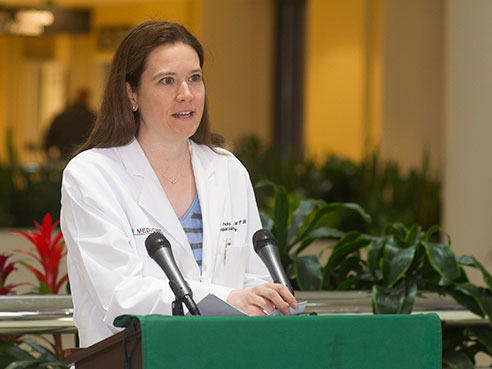 University of Alabama at Birmingham transplant surgeon Jayme Locke, M.D., has been named to the annual Birmingham Business Journal Top 40 Under 40 list.
University of Alabama at Birmingham transplant surgeon Jayme Locke, M.D., has been named to the annual Birmingham Business Journal Top 40 Under 40 list.
The award honors the top young professionals in Birmingham, based on their contributions to their company, their impact on the business world and their role in the community. The full class can be viewed online.
Locke, 38, is the surgical director of the Incompatible Kidney Transplant Program at UAB Hospital and coordinator of the UAB Kidney Chain, which is now the longest kidney-transplant chain in the United States, with 36 living donors and recipients.
“The award is certainly a gratifying personal accomplishment; but perhaps more important, it represents a platform to promote the importance of living kidney donation and transplantation,” Locke said. “It is symbolic of how an environment fertile with leadership, shared vision and tremendous mentorship can build knowledge and skills that really can change our world.”
As far back as a decade ago, UAB’s kidney transplant program began laying the groundwork to build a paired exchange and incompatible transplant program that would help patients so difficult to match. New technologies emerged that enabled researchers and clinicians to specifically define harmful antibodies that are present in many previously transplanted patients.
Once the infrastructure was in place, UAB began recruiting a surgeon with hands-on experience with incompatible transplantation. The search, led by Devin Eckhoff, M.D., director of UAB’s Division of Transplantation, and Bob Gaston, M.D., the Robert G. Luke, M.D., Endowed Chair in Transplant Nephrology, led to Johns Hopkins, where Locke was completing her fellowship.
“We believed strongly she was the right choice,” Eckhoff said. “Dr. Locke had a lot of experience at one of the leading centers in the country in paired kidney exchange and transplanting in people who were highly sensitized. She was there from its inception, completing her residency and fellowship there with two of the world’s leaders in those specialized programs.”
| “Someone asked me recently what the turning point in my career was. Without question it was joining the faculty at UAB. I have been the beneficiary of tremendous institutional leadership and vision and mentorship, and as a result, we have been able to innovate, build and grow cutting-edge programs for our patients and community.” |
UAB’s program that can make transplantation possible between some donors and recipients who would otherwise be incompatible is the South’s leading incompatible kidney transplant programand the only one of its kind in the Southeast. It also fills a major need in Alabama, with more than 3,700 candidates on the kidney transplant waiting list, the second largest in the country.
Many programs offer living donor kidney transplantation but require a completely compatible match.UAB’s program offers patients pretreatment to overcome blood group and/or HLA-incompatible barriers. Paired donation options further reduce incompatibility and facilitate less challenging transplants.
Locke says she pursued a career in kidney transplant for two reasons. One, she says, is that the field is relatively new. “It affords boundless opportunities for innovation and discovery,” she said.
The second reason is the patient population. Those who need kidney transplants are often very sick. In some cases, a transplant is their last hope at life.
“Life is in so many ways miraculous,” Locke said. “The ability to have but a small part of helping to give that gift is both humbling and exhilarating. To look in someone’s eyes and see hope restored is an amazing feeling.”
Locke says the support from UAB’s School of Medicine, the Department of Surgery, the Division of Transplantation, and the team of operating room nurses and staff has been a major reason the incompatible program has had so much success in her time at UAB.
“This has been an incredible team effort and achievement,” Locke said. “Someone asked me recently what the turning point in my career was. Without question it was joining the faculty at UAB. I have been the beneficiary of tremendous institutional leadership and vision and mentorship, and as a result, we have been able to innovate, build and grow cutting-edge programs for our patients and community.”
To become a living kidney donor, call 888-822-7892 or visit uabmedicine.org/kidneytransplant. To indicate your interest in donating your organs after death, visit www.organdonor.gov and sign up today.